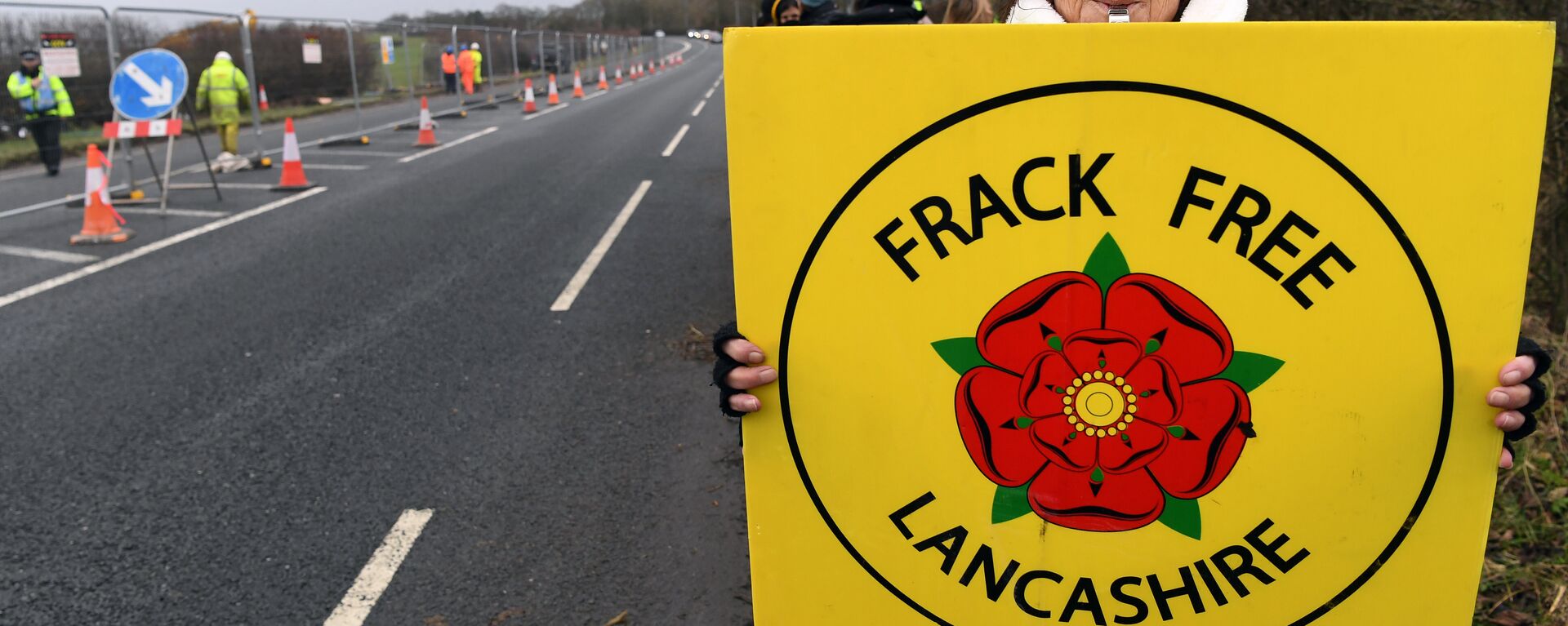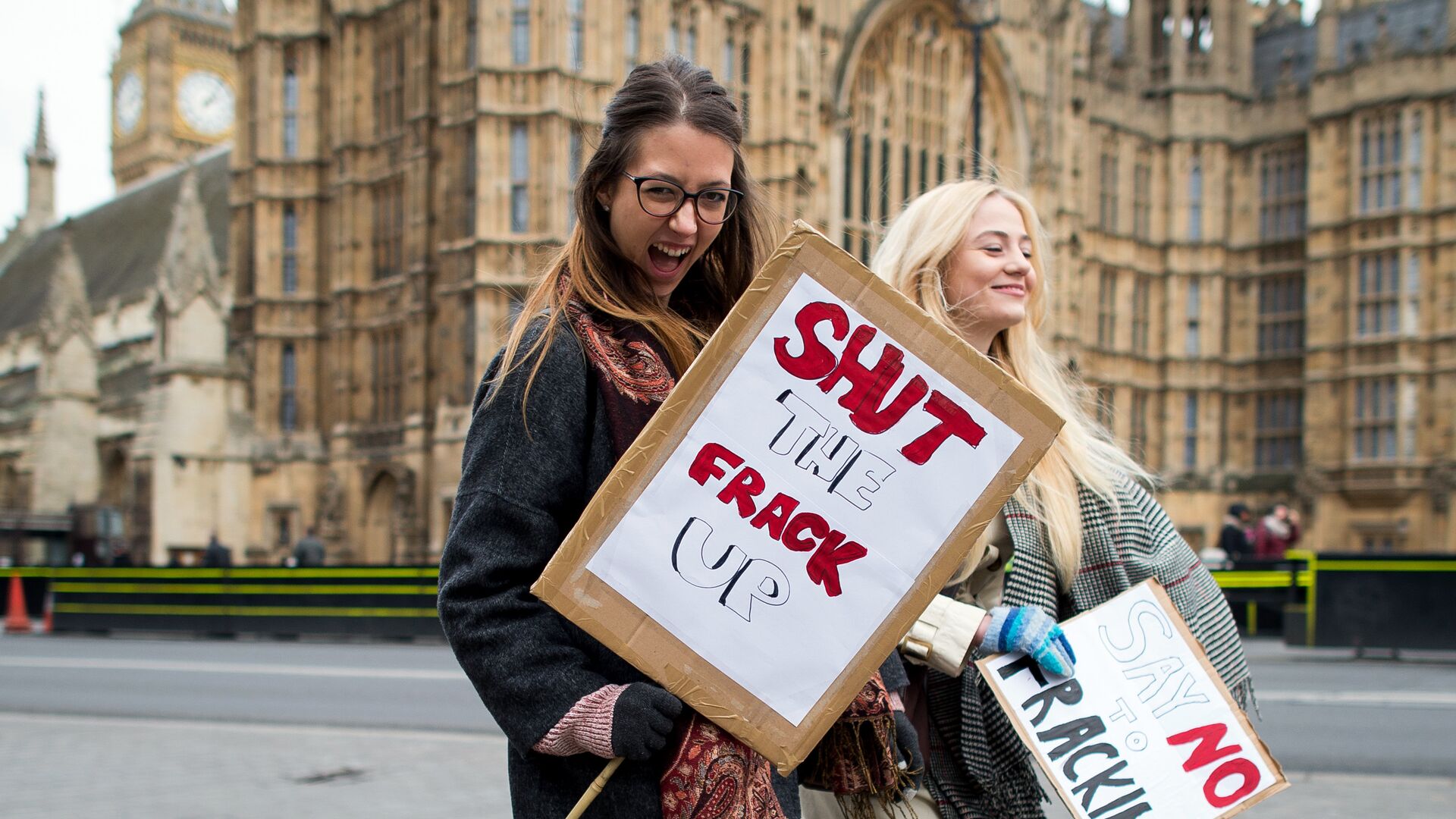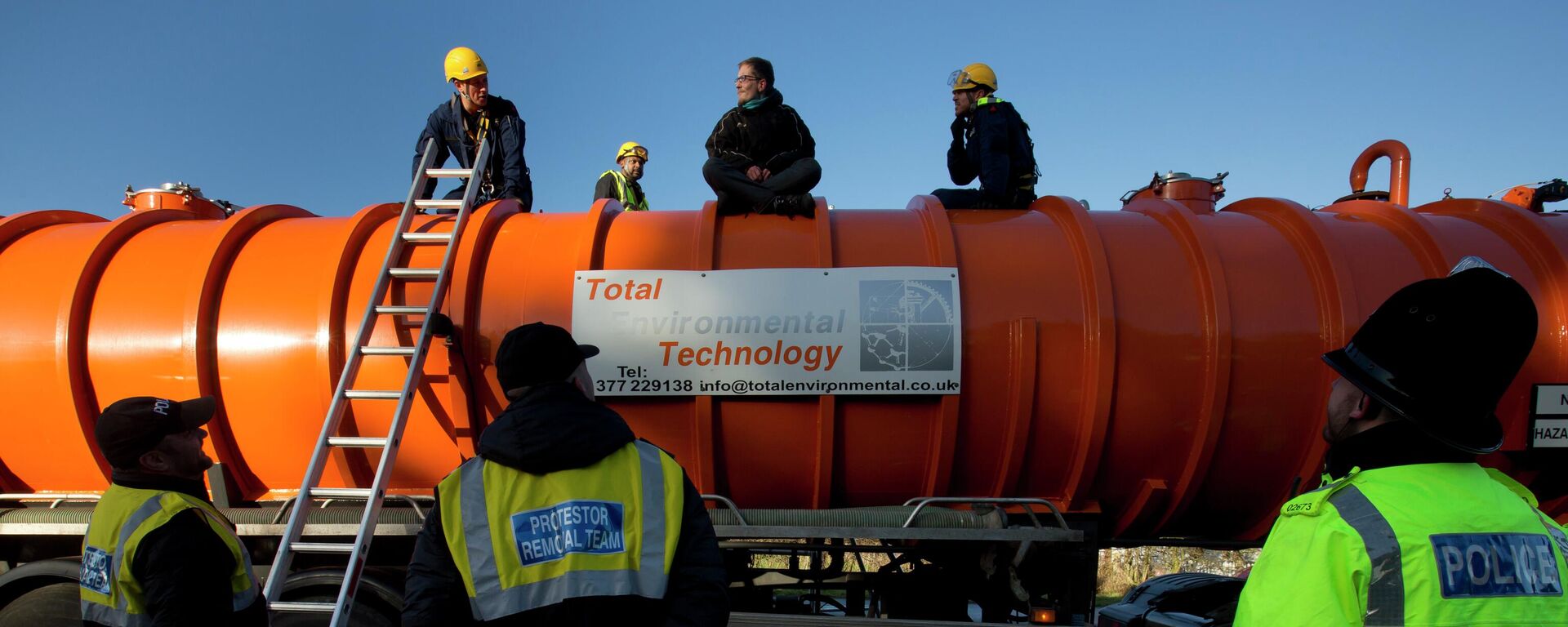https://sputnikglobe.com/20220916/truss-to-scrap-fracking-ban-despite-forecasting-earthquake-risk-remaining-a-scientific-challenge-1100841732.html
Truss to Scrap Fracking Ban Despite 'Knowledge Gaps' About Whether It's An Earthquake Risk
Truss to Scrap Fracking Ban Despite 'Knowledge Gaps' About Whether It's An Earthquake Risk
Sputnik International
Liz Truss, who had spoken in favor of fracking during the UK Tory leadership campaign, lifted the moratorium - just 48 hours into her premiership - on the... 16.09.2022, Sputnik International
2022-09-16T09:14+0000
2022-09-16T09:14+0000
2023-05-28T15:21+0000
world
liz truss
energy prices
fracking
kwasi kwarteng
british geological survey
united kingdom (uk)
https://cdn1.img.sputnikglobe.com/img/104630/60/1046306096_0:158:3015:1854_1920x0_80_0_0_ae233fe663a175a11f0c7500ae8457ae.jpg
Liz Truss is determined to lift the three-year ban on the controversial hydraulic fracking practice despite a disturbing leaked government report, according to The Guardian.The British Geological Survey (BGS) report, due to be published but delayed by the death of Queen Elizabeth II, purportedly admits that forecasting fracking-induced earthquakes and their magnitude “remains a scientific challenge”.The document cited by the outlet adds that there are still “significant existing knowledge gaps” regarding how to identify whether potential new fracking sites may be able to withstand earthquakes of a 3.0 magnitude.The BGS report allegedly offers little proof that progress has been achieved to meet the 2019 Conservative manifesto pledge that fracking would only be resumed if “the science shows categorically that it can be done safely”.Coming up with estimates of maximum magnitudes before and during drilling “remains challenging”, according to the BGS review.The report concluded that the limited number of fracking sites across the country “makes it impossible to determine with statistical significance” the rates of “induced seismicity” and means it is “difficult to make a valid comparison” with other countries, adding that attempts made at Preston New Road, where drilling was abandoned, “show some promise” but “provide estimates that are lower than the maximum observed magnitude.”Lack of ‘Compelling Evidence’Hydraulic fracturing, or fracking, is a technique that involves drilling into the earth and directing a high-pressure mixture of water, sand and chemicals at a rock layer to release the gas and oil inside. The injection of fluid at high pressure into the rock can cause earth tremors in the earth's surface.The practice was halted in the UK in November 2019 amid concerns from the Oil and Gas Authority, opposition from Green groups and locals, and after new research triggered fears over the risk of earthquakes.Back in April, some Tories urged a rethink, claiming fracking would give the country a "competitive and reliable source of energy" amid concerns over rising energy prices.Accordingly, former Business Secretary Kwasi Kwarteng, who is now Chancellor, gave the BGS three months to carry out a scientific review of the impact of fracking and look into new techniques that might help reduce the risk of earthquakes and their magnitude. The review was also to consider whether sites outside Lancashire could be better suited for the drilling procedure. Fracking firm Cuadrilla's test operations in Lancashire caused a tremor of 2.9 magnitude three years ago.At the time, in his letter to the BGS, Kwarteng insisted the government "must be led by the science" in its approach to fracking, adding:Ministers had also stated in April that they would not change their minds regarding the fracking ban without "compelling new evidence".‘Setting a New Ambition’The fact that so little headway has been achieved in reducing and predicting the risk of earthquakes caused by the drilling practice will not deter the UK Prime Minister, according to the publication.As part of her plan to tackle the energy crisis and accelerate the UK's own domestic supply, the PM said the three-year moratorium on drilling for shale gas would be scrapped. It would allow developers to seek planning permission for fracking and get gas flowing in as little as six months, Truss claimed. The measure is part and parcel of a broad package of support announced by Liz Truss on 8 September to tackle soaring energy prices hammering household budgets. Truss said she was "setting a new ambition for our country".The first drilling licenses are expected to be issued as early as next week, sources were cited as saying. At present there are 93 exploratory drilling licenses already granted for 159 areas of the country, stretching from Sussex, Surrey and Dorset, to the Midlands, Yorkshire, Cheshire and Lancashire, reported The Guardian. Three-quarters of the fracking-related sites will be instantly reactivated once the moratorium is lifted.In line with existing seismic rules, drilling is to be stopped if tremors of 0.5 or more on the Richter scale are registered. However, fracking businesses are now lobbying for the limits on seismic activity to be substantially increased, The Daily Telegraph reported.A report by the Royal Society in 2012 stated that tremors of up to magnitude 2 were not generally felt by people above ground and fracking is not expected to cause tremors of more than magnitude 3. However, when Cuadrilla's test operations in Lancashire caused a 2.9 magnitude tremor three years ago, residents nearby complained that their homes had been shaken and the quake caused objects to fall off shelves.Besides challenges related to the country’s geology, the fracking industry faces significant opposition from local communities and environment groups.Non-profit organization Greenpeace underscored that “there have been no significant breakthroughs in the science of prediction and management of earthquakes caused by fracking”.
https://sputnikglobe.com/20191102/uk-introduces-fracking-moratorium-in-england-with-immediate-effect-in-light-of-seismic-activity-1077204701.html
https://sputnikglobe.com/20220405/uk-energy-secretary-orders-review-of-fracking-ban-amid-self-inflicted-gas-crisis-1094504201.html
https://sputnikglobe.com/20220908/how-truss-energy-bills-freeze--drilling-plans-may-amplify-uks-problems-1100554416.html
united kingdom (uk)
Sputnik International
feedback@sputniknews.com
+74956456601
MIA „Rossiya Segodnya“
2022
News
en_EN
Sputnik International
feedback@sputniknews.com
+74956456601
MIA „Rossiya Segodnya“
Sputnik International
feedback@sputniknews.com
+74956456601
MIA „Rossiya Segodnya“
liz truss, energy prices, fracking, kwasi kwarteng, british geological survey, united kingdom (uk)
liz truss, energy prices, fracking, kwasi kwarteng, british geological survey, united kingdom (uk)
Truss to Scrap Fracking Ban Despite 'Knowledge Gaps' About Whether It's An Earthquake Risk
09:14 GMT 16.09.2022 (Updated: 15:21 GMT 28.05.2023) Liz Truss, who had spoken in favor of fracking during the UK Tory leadership campaign, lifted the moratorium - just 48 hours into her premiership - on the drilling technology used to extract oil and natural gas from deep underground.
Liz Truss is determined to lift the three-year ban on the controversial
hydraulic fracking practice despite a disturbing leaked government report, according to The Guardian.
The British Geological Survey (BGS) report, due to be published but delayed by
the death of Queen Elizabeth II, purportedly admits that forecasting fracking-induced earthquakes and their magnitude “remains a scientific challenge”.
The document cited by the outlet adds that there are still “significant existing knowledge gaps” regarding how to identify whether potential new fracking sites may be able to withstand earthquakes of a 3.0 magnitude.
The BGS report allegedly offers little proof that progress has been achieved to meet the 2019 Conservative manifesto pledge that fracking would only be resumed if “the science shows categorically that it can be done safely”.
Coming up with estimates of maximum magnitudes before and during drilling “remains challenging”, according to the BGS review.
The report concluded that the limited number of fracking sites across the country “makes it impossible to determine with statistical significance” the rates of “induced seismicity” and means it is “difficult to make a valid comparison” with other countries, adding that attempts made at Preston New Road, where drilling was abandoned, “show some promise” but “provide estimates that are lower than the maximum observed magnitude.”

2 November 2019, 00:15 GMT
Lack of ‘Compelling Evidence’
Hydraulic fracturing, or fracking, is a technique that involves drilling into the earth and directing a high-pressure mixture of water, sand and chemicals at a rock layer to release the gas and oil inside. The injection of fluid at high pressure into the rock can cause earth tremors in the earth's surface.
The practice was halted in the UK in November 2019 amid concerns from the Oil and Gas Authority, opposition from Green groups and locals, and after new research triggered fears over the risk of earthquakes.
Back in April, some Tories urged a rethink, claiming fracking would give the country a "competitive and reliable source of energy" amid concerns over
rising energy prices.
Accordingly, former Business Secretary Kwasi Kwarteng, who is now Chancellor, gave the BGS three months to carry out a scientific review of the impact of fracking and look into new techniques that might help reduce the risk of earthquakes and their magnitude. The review was also to consider whether sites outside Lancashire could be better suited for the drilling procedure. Fracking firm Cuadrilla's test operations in Lancashire caused a tremor of 2.9 magnitude three years ago.
At the time, in his letter to the BGS, Kwarteng insisted the government "must be led by the science" in its approach to fracking, adding:
"It remains the case that fracking in England would take years of exploration and development before commercial quantities of gas could be produced for the market, and would certainly have no effect on prices in the near term.”
Ministers had also stated in April that they would not change their minds regarding the fracking ban without "compelling new evidence".
The fact that so little headway has been achieved in reducing and predicting the risk of earthquakes caused by the drilling practice will not deter the UK Prime Minister, according to the publication.
As part of her plan to tackle the energy crisis and accelerate the UK's own domestic supply, the PM said the three-year moratorium on drilling for shale gas would be scrapped. It would allow developers to seek planning permission for fracking and get gas flowing in as little as six months, Truss claimed. The measure is part and parcel of a
broad package of support announced by Liz Truss on 8 September to tackle soaring energy prices hammering household budgets. Truss said she was "setting a new ambition for our country".
"Far from being dependent on the global energy market and the actions of malign actors, we will make sure that the UK is a net energy exporter by 2040," she said.

8 September 2022, 17:59 GMT
The first drilling licenses are expected to be issued as early as next week, sources were cited as saying. At present there are 93 exploratory drilling licenses already granted for 159 areas of the country, stretching from Sussex, Surrey and Dorset, to the Midlands, Yorkshire, Cheshire and Lancashire, reported The Guardian. Three-quarters of the fracking-related sites will be instantly reactivated once the moratorium is lifted.
In line with existing seismic rules, drilling is to be stopped if tremors of 0.5 or more on the Richter scale are registered. However, fracking businesses are now lobbying for the limits on seismic activity to be substantially increased, The Daily Telegraph reported.
A report by the Royal Society in 2012 stated that tremors of up to magnitude 2 were not generally felt by people above ground and fracking is not expected to cause tremors of more than magnitude 3. However, when Cuadrilla's test operations in Lancashire caused a 2.9 magnitude tremor three years ago, residents nearby complained that their homes had been shaken and the quake caused objects to fall off shelves.
Besides challenges related to the country’s geology, the fracking industry faces significant opposition from local communities and environment groups.
Non-profit organization Greenpeace underscored that “there have been no significant breakthroughs in the science of prediction and management of earthquakes caused by fracking”.
“For the Truss government to reverse its position on shale gas on the back of this would simply be breaking a clear promise on which they were elected,” the organization's chief scientist, Dr Doug Parr, said.





